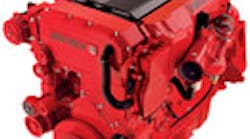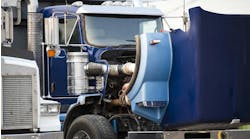Daimler Trucks North America (DTNA) has announced it will offer Cummins heavy- and medium-duty engines alongside its own Detroit Diesel and Mercedes-Benz engine lines, becoming the latest OEM to sell engines with both SCR and EGR technologies to meet 2010 EPA regulations.
"This decision will complement our current successful and proprietary product line of Detroit Diesel and Mercedes-Benz engines. It will expand and strengthen the range of choices for our customers, and establish Cummins as a full range vendor engine partner," said Chris Patterson, president & CEO of DTNA. "This action was a result of many months of carefully considered planning and consulting with our key customers to determine engine needs and preferences.”
The Cummins 14.8L ISX heavy-duty diesel engine will be available to power Freightliner, Sterling and Western Star Class 8 vehicles. In addition, Cummins will supply medium-duty ISB, ISC and ISL engines for Freightliner trucks and chassis, Sterling trucks and Thomas Built buses in Classes 5 through 7, DTNA said.
The first model to use the Cummins ISX will be the Freightliner Cascadia, which is scheduled for initial delivery in January 2009, the company added.
Detroit Diesel launched the DD15, with 14.8-liter displacement, in October 2007, and the company said it will offer 12.8L (DD13) and 15.6L (DD16) engines in the next few months, displacing current Detroit Diesel and Mercedes-Benz heavy-duty engines, the company said.
According to David Siler, director of marketing for Detroit Diesel, the agreement had more to do with Cummins being the only independent engine provider rather than the OEM solely wanting an EGR engine for 2010.
“I would say the main reason we wanted to offer both is that customers want to have choices, and we wanted to have two engine offerings,” he told FleetOwner. “Since Caterpillar exited the market, it was time to announce we were going to Cummins…It’s more about having two different technologies than it is SCR vs. EGR.”
Christy Nycz, spokesperson for Cummins, told FleetOwner that the extra capacity that the DTNA deal would necessitate will require the company to ramp up production in the near future.
“Cummins is making modest investments in our heavy-duty engine business capacity in response to expected increases in NAFTA heavy duty truck production and higher shares vs. the last cycle,” Nycz said. “This will allow us to increase ISX production by approximately 20% in the second half of 2008. Cummins will continue to work closely with our customers to define volume requirements and to right-size our capacity going forward,” she added.
According to Alan Treasure, director of marketing for Paccar, Inc.—which is also using Cummins EGR engine technology alongside its own SCR solution in its Kenworth and Peterbilt trucks—it’s a matter of options. “We offer a customer choice of engines, and different engines offer different 2010 solutions,” he told FleetOwner. “Some will go one way and some will go the other. But most people are still assessing the situation and their needs—I don’t think anyone’s set in their ways yet.”
View more Fleet Owner equipment news and other commercial trucking-related articles.



